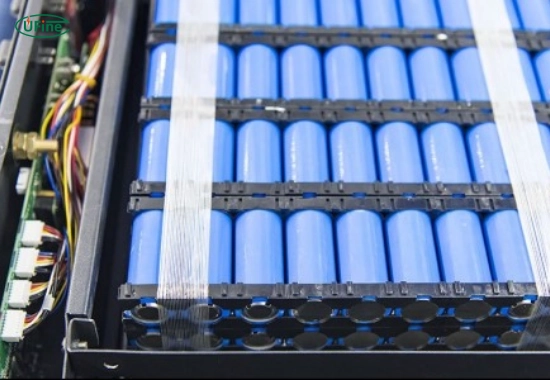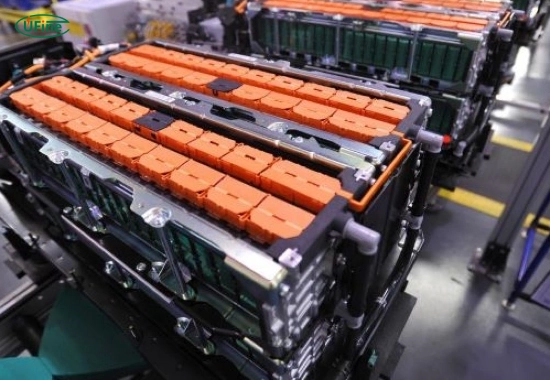In an age where uninterrupted power supply (UPS) systems are crucial for residential and commercial applications, the choice of battery technology plays a significant role in ensuring reliability and efficiency. UPS lithium batteries have emerged as a leading choice among the various options available due to their superior performance and longevity. This article will explore why a UPS lithium battery can be a game-changer for your power backup needs.
Part 1. What is a UPS lithium battery?
A UPS lithium battery is a specialized energy storage solution that provides backup power during electrical outages or fluctuations. These batteries utilize lithium-ion technology, which offers several advantages over traditional lead-acid batteries:
- Higher Energy Density: Lithium batteries can store more energy in a smaller and lighter form factor, making them ideal for limited-space applications.
- Longer Lifespan: Lithium batteries typically last up to 10 years or more, while lead-acid batteries generally last 3 to 5 years.
- Faster Charging: Lithium batteries have a higher charge acceptance rate, allowing them to recharge more quickly than lead-acid batteries.
These features make lithium batteries an attractive option for UPS systems, enhancing their reliability and efficiency in power backup.
Part 2. How do UPS lithium batteries work?
UPS lithium batteries function by storing electrical energy and releasing it when needed. Here’s how they operate:
- Energy Storage: The UPS charges the lithium battery when connected to the main power supply.
- Power Monitoring: The system continuously monitors incoming voltage levels. It automatically switches to battery power if it detects an outage or significant fluctuation.
- Power Supply: The stored energy is converted into usable electricity, ensuring critical equipment remains operational.
This seamless transition is vital for maintaining productivity and safeguarding sensitive equipment during power disruptions.
Part 3. What are the benefits of using a UPS lithium battery?
Choosing a UPS lithium battery comes with numerous benefits that can significantly impact your power backup strategy:
- Efficiency: Lithium batteries have higher charge and discharge efficiency than their lead-acid counterparts, reducing wasted energy.
- Compact Size: Their smaller size allows for more flexible installation options, especially in space-constrained environments.
- Lightweight Design: Lithium batteries are lighter, making them easier to handle and install.
- Environmental Impact: Lithium batteries often have a lower ecological footprint than traditional options due to their longer lifespans and recyclability.
These advantages make them an excellent choice for various applications, from home use to industrial settings.
Part 4. Are there any drawbacks to UPS lithium batteries?
While UPS lithium batteries offer many benefits, they also come with certain drawbacks:
- Higher Initial Cost: The upfront investment for lithium batteries is typically higher than lead-acid batteries.
- Temperature Sensitivity: Lithium batteries can be sensitive to extreme temperatures, affecting their performance and lifespan if not appropriately managed.
- Complexity in Recycling: Although recyclable, the recycling process for lithium batteries can be more complex than traditional lead-acid options.
Understanding these drawbacks is essential when considering your options for power backup solutions.
Part 5. How do UPS lithium batteries compare to traditional lead-acid batteries?
When comparing UPS lithium batteries to traditional lead-acid options, several key differences become evident:
Key Differences
- Lifespan: Lithium batteries typically last 8 to 10 years, while lead-acid batteries usually last around 3 to 5 years.
- Energy Density: Lithium-ion technology allows for higher energy density, meaning it can store more energy in less space than lead-acid batteries.
- Recharge Time: Lithium batteries can be fully charged in about 2 hours, while lead-acid batteries may take up to 24 hours for a full charge.
- Weight: Lithium batteries are significantly lighter—often weighing 60% to 80% less than equivalent lead-acid systems.
- Cycle Life: Lithium-ion systems can endure up to 2-3 times more charge/discharge cycles than lead-acid systems before needing replacement.
Comparison Table
| Feature | UPS Lithium Battery | Traditional Lead-Acid Battery |
|---|---|---|
| Lifespan | 8-10 years | 3-5 years |
| Energy Density | High | Lower |
| Recharge Time | ~2 hours | Up to 24 hours |
| Weight | 60%-80% lighter | Heavier |
| Cycle Life | Up to 5000 cycles | ~300 cycles |
This comparison illustrates why many users prefer lithium over lead acid for reliable power backup solutions.
Part 6. What applications benefit from UPS lithium batteries?
UPS lithium batteries are versatile and can be used in various applications:
- Data Centers: Ensuring continuous operation of servers and networking equipment during outages.
- Home Offices: Providing backup power for computers and other essential devices.
- Healthcare Facilities: Maintaining critical medical equipment during power interruptions.
- Industrial Settings: Supporting machinery and operations that require uninterrupted power supply.
Their adaptability makes them suitable for both residential and commercial use.
Part 7. How to choose the right UPS lithium battery?
Selecting the right UPS lithium battery involves considering several factors:
- Power Requirements: Determine the wattage needed for your devices.
- Backup Time Needed: Assess how long you need the backup power during an outage; this will help you choose the right capacity.
- Space Availability: Based on the battery’s size, ensure enough space for installation; consider vertical stacking if needed in tight spaces.
- Budget Considerations: Factor in initial costs and long-term savings from reduced maintenance and replacement needs; remember that lower total cost of ownership (TCO) may justify higher upfront costs.
- Manufacturer Reputation: Research brands known for quality and reliability; customer reviews can provide insights into performance and service life expectations.
By evaluating these aspects carefully, you can make an informed decision tailored to your specific needs while maximizing efficiency and reliability in your power backup system.
Part 8. How do I maintain my UPS lithium battery?
Proper maintenance is crucial for extending the lifespan of your UPS lithium battery:
- Regular Testing: Periodically test the battery’s performance using built-in diagnostic tools or external testers to ensure it holds a charge effectively.
- Temperature Control: Keep the battery in a climate-controlled environment; avoid exposing it to extreme temperatures that could degrade performance or safety over time.
- Clean Connections: Ensure all connections are clean and corrosion-free; this promotes optimal performance and prevents potential issues during operation.
- Firmware Updates: If your UPS has software or firmware updates available, install them promptly; manufacturers often release updates that enhance performance or safety features.
Following these maintenance tips will help ensure your system remains reliable while maximizing its operational lifespan.
Part 9. What are some common misconceptions about UPS lithium batteries?
Several myths surround UPS lithium batteries that can lead to confusion:
- Myth 1: They are too expensive – While the initial cost is higher, long-term savings from durability and efficiency often outweigh this expense due to fewer replacements.
- Myth 2: They require extensive maintenance. They require less maintenance than lead-acid options because they do not need regular water refilling or equalization charging.
- Myth 3: They can’t be recycled safely – Lithium batteries can be recycled; however, it’s crucial to follow local regulations regarding disposal as they may differ from those applicable to traditional lead-acid batteries.
Clearing these misconceptions can help consumers make better-informed choices about their power backup systems and understand the value of investing in advanced technologies like lithium-ion solutions.
Part 10. FAQs
-
What is the average lifespan of a UPS lithium battery?
The average lifespan of a UPS lithium battery is typically over 10 years, significantly longer than traditional lead-acid options, which last around 3-5 years. -
Are UPS lithium batteries safe?
Yes, UPS lithium batteries are safe when used correctly and maintained properly. However, following manufacturer guidelines regarding installation and usage is crucial due to their higher energy density than other battery types. -
Can I use a UPS lithium battery with any device?
Most devices can be powered by a UPS with compatible output; however, always check compatibility with your specific equipment before connecting it to avoid damage or operational issues during critical times. -
How do I know if my UPS needs a new battery?
Signs that your UPS may need a new battery include frequent alarms indicating low battery status or significantly reduced backup time during outages; monitoring performance regularly helps catch these issues early on before they significantly impact operations. -
Is there any unique recycling process for UPS lithium batteries?
Yes, while they can be recycled safely through designated facilities that handle electronic waste properly, it’s essential always to follow local regulations regarding disposal as they may differ from those applicable to traditional lead-acid batteries primarily because of varying chemical compositions involved in each type’s construction processes overall—ensuring both environmental responsibilities alongside safety considerations throughout each stage involved within this lifecycle management aspect overall!
Related Tags:
More Articles

How Cobalt Free Batteries Are Transforming the Electric Vehicle Market?
Cobalt-free batteries are transforming the electric vehicle market with a sustainable choice. This article explores their benefits, challenges, and potential.
Lithium Manganese Batteries: A Comprehensive Guide
Lithium manganese batteries are transforming energy storage. This guide covers their mechanisms, advantages, applications, and limitations.
12 Volt 100Ah Lithium Battery: 12 Important Facts
Want to know about 12 Volt 100Ah lithium batteries? Explore essential facts that reveal their advantages and uses. Get informed today!
Top Benefits of Choosing a 100 Amp Hour Lithium Battery
A 100 amp hour lithium battery enhances energy storage, offering benefits like efficiency, longevity, and versatility. This article explores these advantages.
Which Golf Cart Battery’s Best? Flooded, Gel, AGM, Li-ion
Confused about golf cart batteries? Compare flooded, gel, AGM, and Li-ion options. Get the best battery for your needs now!





